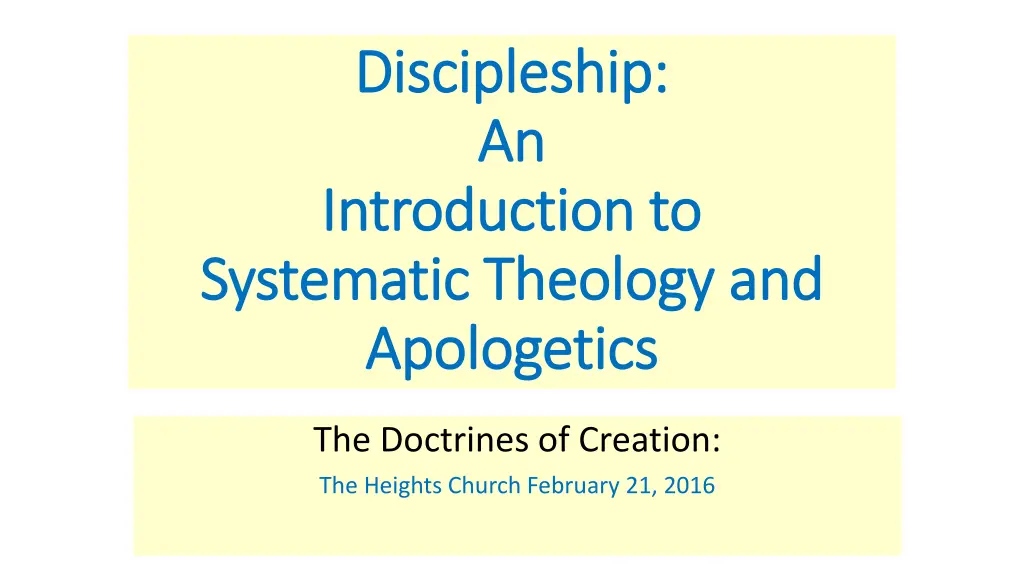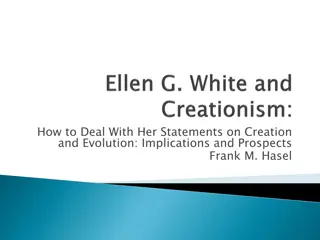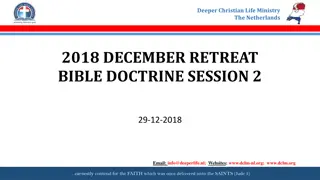
Understanding Systematic Theology and Apologetics in Discipleship
Learn about the significance of systematic theology, the essence of doctrine, and the purpose of apologetics in the context of discipleship. Explore key concepts such as the doctrine of creation and the big picture of God's eternal plan. Delve into the depths of Christian faith through a structured study approach.
Download Presentation

Please find below an Image/Link to download the presentation.
The content on the website is provided AS IS for your information and personal use only. It may not be sold, licensed, or shared on other websites without obtaining consent from the author. If you encounter any issues during the download, it is possible that the publisher has removed the file from their server.
You are allowed to download the files provided on this website for personal or commercial use, subject to the condition that they are used lawfully. All files are the property of their respective owners.
The content on the website is provided AS IS for your information and personal use only. It may not be sold, licensed, or shared on other websites without obtaining consent from the author.
E N D
Presentation Transcript
Discipleship: Discipleship: An An Introduction to Introduction to Systematic Theology and Systematic Theology and Apologetics Apologetics The Doctrines of Creation: The Heights Church February 21, 2016
What is Systematic Theology? Systematic theology is an orderly, coherent study of the principal doctrines of the Christian faith. R.C. Sproul 1. Organized by topics. 2. It attempts to summarize the teaching of Scripture in brief, understandable, and very carefully formulated statements. 3. Much more detailed than ordinary Bible studies. 4. Summarizes Biblical teaching much more accurately than most Bible studies. 5. Fairly evaluates all the relevant passages for a given topic. 6. Systematic theology does not improve upon the Bible, but it does aid us in understanding and explaining the Bible.
What is Doctrine? A doctrine* is what the whole Bible teaches today about some particular topic. Wayne Grudem 1. A doctrine is the result of doing systematic theology 2. We will study those doctrines that meet at least one of the following: Most emphasized in Scripture Have been most significant throughout church history Are more important today than in previous church history *Roman Catholic and Lutheran theologians may use dogma to refer to doctrines that have official church endorsement.
What is Apologetics? Apologetics is the discipline that seeks to provide a defense of the truthfulness of the Christian faith for the purpose of convincing unbelievers. Wayne Grudem 1. Apologetics boils down to: Knowing what we believe Why we believe it And being able to communicate what we believe and why in an effective, winsome manner to those who question our faith. 2. John Calvin observed in his Institutes we seek proof not persuasion.
The Really Big Picture The Really Big Picture Before all time; prior to all worlds; when there was nothing "outside of" God Himself; when the Father, Son, and Spirit found eternal, absolute, and unimaginable blessing, pleasure, and joy in Their holy triunity it was Their agreed purpose to create a world. That world would fall. But in unison and at infinitely great cost this glorious triune God planned to bring you (if you are a believer) grace and salvation. Sinclair Ferguson
What is the Doctrine of Creation? What is the Doctrine of Creation? God has revealed himself through both special revelation (the Bible) and through general revelation (nature). In the beginning, God created the heavens and the earth. Genesis 1:1 For the wrath of God is revealed from heaven against all ungodliness and unrighteousness of men, who by their unrighteousness suppress the truth. For what can be known about God is plain to them, because God has shown it to them. For his invisible attributes, namely, his eternal power and divine nature, have been clearly perceived, ever since the creation of the world, in the things that have been made. So they are without excuse. Romans 1:18-20
What is the Doctrine of Creation? What is the Doctrine of Creation? God has revealed himself through both special revelation (the Bible) and through general revelation (nature). Thomas Aquinas (1225 1274) Dominican scholar taught truth is revealed in three ways: 1. Truths exclusively revealed in the Bible. (example: the gospel) 2. Truths exclusively revealed through investigation of nature. (example laws of physics) 3. Truths revealed by both the Bible and the investigation of nature. (example the universe, plants and animals, and humans were created)
What is the Doctrine of Creation? What is the Doctrine of Creation? God has revealed himself through both special revelation (the Bible) and through general revelation (nature). Thomas Aquinas called the third category mixed articles and took issue with the Islamic theology of double truth which claimed that mixed articles could be true in faith and false in reason or vice versa. Aquinas correctly taught that the Bible (faith) and nature (reason) when correctly understood NEVER contradict one another because both have God as their source and both bear witness to Him. Therefore, if we think the Bible says one thing about Creation and science says another, we at least misunderstand either the Bible or science OR possibly misunderstand both the Bible and science!
What is the Doctrine of Creation? What is the Doctrine of Creation? Law of Non-conradiction: Something cannot be A and not A at the same time and in the same relationship. Double Truth (Islam) True in Faith True in Reason True in Faith False in Reason False in Faith True in Reason False in Faith False in Reason Double Truth according to Logic (Thomas Aquinas ) True in Faith True in Reason True in Faith False in Reason False in Faith True in Reason False in Faith False in Reason






















